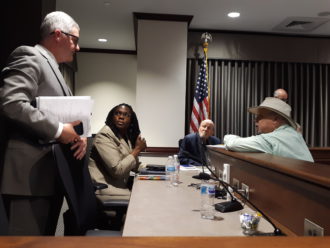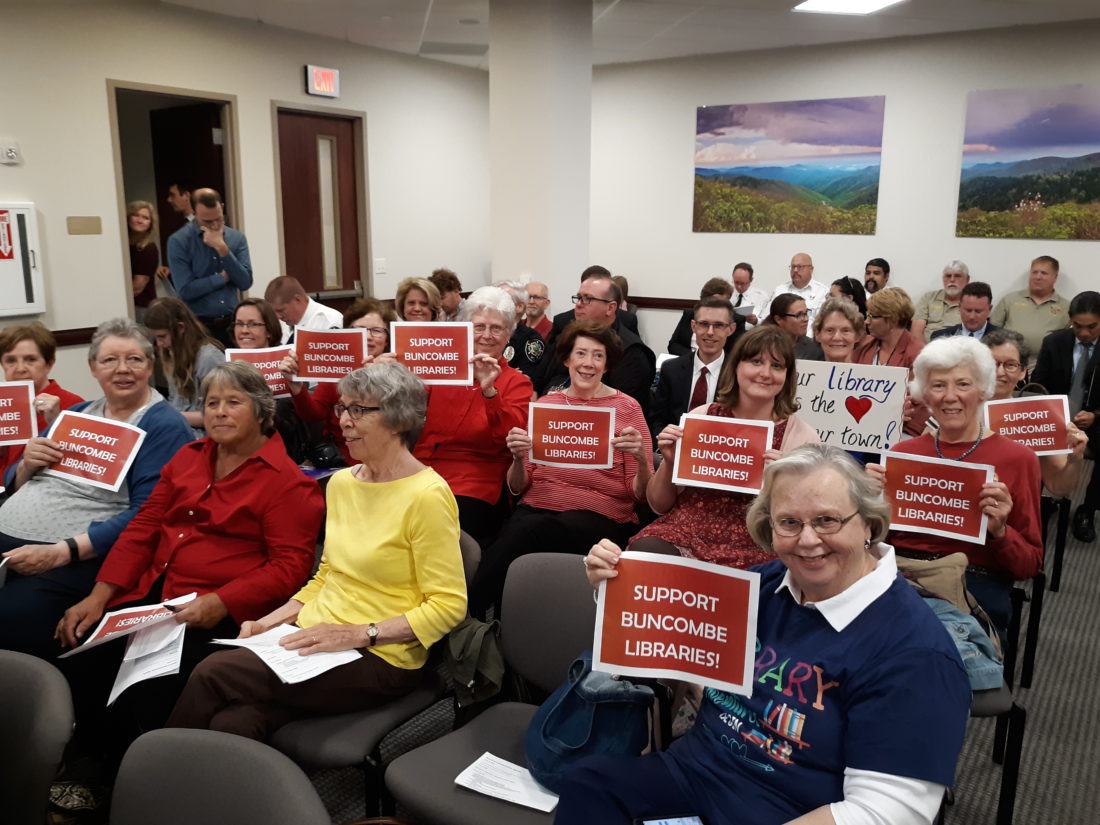To borrow a phrase from British synthpop duo Eurythmics: Everybody’s looking for something. Over 50 residents attended the hearing on Buncombe County’s proposed fiscal year 2019-20 budget at the June 4 Board of Commissioners meeting, with most of the 16 public commenters making the case for allocations beyond the roughly $334.52 million in suggested general fund spending.
The most visible advocacy came from a group of over a dozen public library supporters, many of whom wore red and carried signs during the hearing. Weaverville resident Ruth O’Donnell, vice chair of the county’s Library Board, pointed to disparities in per-capita funding among Buncombe and other North Carolina counties as she asked commissioners to fund an assistant director for the system.
Henderson County, O’Donnell said, spent $24.50 per capita on its libraries in fiscal year 2018, while Durham County spent $37.94; by comparison, Buncombe only spent $20.84. “This library system, Buncombe County Public Libraries, is in need of some significant additional funding in order to bring it into the 21st century,” she said.
Other speakers sought more funding for Buncombe County Schools, which is currently slated to receive an almost $2.77 million bump over last year’s county support. Pat Bryant, Erwin District representative for the Buncombe County school board, hoped commissioners would support the system’s full request of over $5.01 million to fund behavioral support staff and teacher assistants.
To emphasize the need for the latter employees, Bryant asked the commissioners to imagine hosting a birthday party for elementary-age students while solving the logistical challenges that teacher assistants address. “At various times during the party, four or five kids have to go to the bathroom at the same time — you’re by yourself, and you only have two bathrooms,” he offered as an example.
Even without those employees, noted County Manager Avril Pinder, the county schools would still be on the hook for approximately $3.7 million in state-mandated salary increases next fiscal year. If the still-pending state budget does not fund those costs, she explained, Buncombe would work to cover the nearly $1 million gap between the system’s nonnegotiable need and the currently recommended county allocation.
Several nonprofit representatives, including Dawn Chávez of Asheville GreenWorks, Anthony Thomas with the YMI Cultural Center and Jim Barrett of Pisgah Legal Services, asked for more money through the county’s Strategic Partnership Funds. But resident Jerry Rice argued that Buncombe should pump the brakes on its awards.

“The taxpayer needs some relief, and I’m one of them,” said Rice. “We can hand out money all day; there’s a big pit that you’ll never fill with money.”
And resident Don Yelton took issue with county staff members he said would not provide him with a printed version of the proposed budget document. He presented Pinder with a copy of a lawsuit he’d previously filed against the county regarding public records and asked for greater accessibility. “If anybody up there has seen a hard copy of that budget, those 53 pages — by law, I have the right to see it, and by law, there can be no gatekeeper of the information,” he said.
Commissioners did not comment on the budget and took no action during the public hearing. Their vote to approve the proposed budget is scheduled for the board’s regular meeting at 5 p.m. on Tuesday, June 18, in Room 326 at 200 College St. in downtown Asheville.




Libraries need to receive less funding since they are used by fewer and fewer people. We need to transition to community spaces that have more computer access and less physical books.
It would be uplifting to see more of the residents attending the Commissioners’ Meeting to have presented well thought out plans, or at least
sketches of ideas for providing better services to the County citizens, be it library, school, transit, or other public funded accommodations.
To simply step up to the podium and ask for more money for this or that is repeating what many bureaucrats and politicians do.
And wasting everybody’s time.
Peer pressure with zero education as to how to govern. Max money, zero results. Send em to school (preferably out of state).